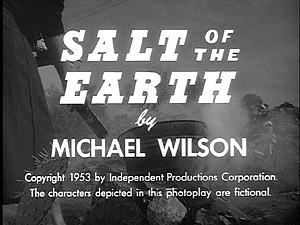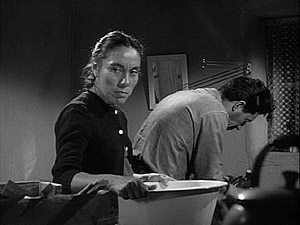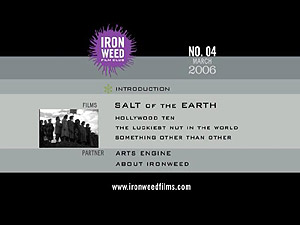| Reviews & Columns |
|
Reviews DVD TV on DVD Blu-ray 4K UHD International DVDs In Theaters Reviews by Studio Video Games Features Collector Series DVDs Easter Egg Database Interviews DVD Talk Radio Feature Articles Columns Anime Talk DVD Savant Horror DVDs The M.O.D. Squad Art House HD Talk Silent DVD
|
DVD Talk Forum |
|
|
| Resources |
|
DVD Price Search Customer Service #'s RCE Info Links |
|
Columns
|
|
|
Salt of The Earth (Ironweed vol 4)
The only blacklisted American film
 |
Loves:
Likes: Old movies, subversive films, the Ironweed concept
Dislikes:
Hates:
The Story So Far...
Ironweed Film Club offers subscriptions to their monthly DVD, which features two or three films that fit progressive political and social themes, mostly in the documentary genre. The theme changes each month, and the production run is limited, which means you have to jump on a title if you want it, because it won't be available for long.
Ironweed has released four issues so far, and DVDTalk has reviews of the previous three:
• Volume 1
• Volume 2
• Volume 3
The Movie
The story of New Mexican mine-workers struggling against a heartless company's efforts to strip them of their labor rights is the backbone of a film that is more effective as an artifact than as a movie. After all, not every movie stars people who actually lived the story played out on screen (unless of course they are documentaries.) Here, the mine-workers who were central to the fight get to replay their heartaches with acting ability on par with your local junior high-school musical.
Though that's certainly interesting, the fact that the creative minds behind this film were blacklisted, along with the movie itself, makes it much more important. Seen as a Communist manifesto, this union-positive production became vilified, before becoming deified as a voice in the wilderness against the oppression of the McCarthy-era U.S. government, in which freedom was cut short in the name of security (Sound familiar?)
 The plot focuses on Ramon, a mine-worker, and his strong-willed wife Esperanza, who supports her husband as he battles the mine company to improve conditions. As was usually the case at the time, the big-money companies fought back, and a strike was the only solution, and even that didn't work, as the corrupt police were in on the racket and money was in short supply for the workers. What they had working for them was the strength of their women, who helped them at every step, even if they weren't recognized for it.
The plot focuses on Ramon, a mine-worker, and his strong-willed wife Esperanza, who supports her husband as he battles the mine company to improve conditions. As was usually the case at the time, the big-money companies fought back, and a strike was the only solution, and even that didn't work, as the corrupt police were in on the racket and money was in short supply for the workers. What they had working for them was the strength of their women, who helped them at every step, even if they weren't recognized for it.
Even if it stuck solely to the union plot, this movie would have been considered progressive, but throw in a feminist-friendly subplot about equal rights for men and woman, and it's easy to understand why Salt of the Earth was considered revolutionary for its time. In that way, the film deserves every credit coming to it. Unfortunately, it just doesn't work as a movie. The performances by a mostly amateur cast, are wooden and at times laughable, while the plot meanders, and doubles back, covering the same ground twice, showing either a shallow plot or ineffective filmmaking.
In the opinion of your humble reviewer, the best part of this disc is found after the credits roll. The film's theatrical trailer is included, and it's a doozy, playing up a single scene as an example of why the movie is a hilarious comedy for the whole family. Nevermind the fact that the scene is completely out of tone with the rest of the film, but it has aged terribly, as social mores have changed quite a bit since this movie came out.
It's worth noting that this movie is in the public domain now, and thus, you can watch it for free online. Of course, that version looks awful, and this one is much improved. But it's also worth noting that this isn't the best version of the film available on DVD, as Organa offers a more in-depth edition with more features, though it has the same transfer, which Ironweed apparently licensed.
 The DVD
The DVD
Available to subscribers to the Ironweed film club, this film is presented on one DVD, the March 2006 issue. The disc comes packaged in the now trademark well-designed ThinPak case with a four-page insert that includes a letter from the club's president and an excerpt from Salt of the Earth producer Paul Jarrico's testimony before the House UnAmerican Activities Committee. That testimony is an excellent read and disturbingly applicable to today.
In a cute touch related to one of the extras, they also send along a sample of Fair-Trade organic coffee from Green Mountain Coffee.
The DVD has another of Ironweed's classy animated, full-frame main menus with a transition into the submenus, which have options to watch the film, select scenes (for Salt of the Earth), check out the extras and view info screens about Ironweed and Arts Engine. The scene-selection menu is a text lists of chapters, while there are no audio options, subtitles or closed captioning.
The Quality
The full-frame black and white transfer looks nice, but it doesn't come close to my standard-bearer, the retina-burning quality of Criterion's Carnival of Souls. Flickering, dirt, damage and haloing can be seen through the film's inconsistent presentation, but it's just plain old; not unwatchable.
A Dolby Digital 2.0 track delivers the mono audio in relatively crisp quality, presenting clear dialogue and music that doesn't interfere much with the mix. The sound can be a bit tinny, and has obvious static in parts, but one couldn't expect much more.
The Extras
In addition to a video introduction by Ironweed's president Adam Werbach, three short films make up the extras here. First up is Hollywood Ten, a slim documentary about the filmmakers blacklisted during the McCarthy era. The 15-minute film starts in a very repetitive manner, introducing each man in short segments, but once they get to speak, it grows in power and meaning. Though Hollywood Ten isn't exactly enthralling, it's at least in decent condition for its age, and is an interesting piece of film and political history.
Like the first issue of "Ironweed," two of the extra shorts have nothing much to do with the main feature, starting with "The Luckiest Nut in the World," a mixed-media look at how global economic trends affect peanuts. The tale is told by a singing cowboy version of Mr. Peanut, and has good energy, but I'm not exactly sure what the point is, as it compares the struggles of nut growers in Africa to the success of their American counterpoints, but doesn't seem to give a point of view on that comparison. Being allowed to draw your own conclusions is great, but the best films in this realm have a message.
The final extra is the nine-minute "Something Other than Other," which features voiceovers by a mixed-raced couple and their thoughts about how their son is seen, especially when it comes to question of racial identity. Another mixed-media piece, this one has the feel of a Stan Brakhage film, with a very artistic look, built around still photos and home videos. It's not a bad short, but it's something like watching family photo slides while your friends talk about them.
 The Bottom Line
The Bottom Line
Salt of the Earth feels like one of those films that is better respected for what it stands for than what it is. As an independent production by blacklisted creators about socially conscious topics starring people who lived the film's story, there's a lot about this film that's worth admiring. Unfortunately, the quality of the production is not. From the bad acting to the worse stunts to the overly simplistic storyline, this is just not a good movie. The extras help lift the entertainment level of the disc, but they are just a small fraction of the overall package. If you really want a quality version of the main feature, this is a good way to get it, but because of a number of factors, this is an issue that doesn't need a spot on your shelf.
Francis Rizzo III is a native Long Islander, where he works in academia. In his spare time, he enjoys watching hockey, writing and spending time with his wife, daughter and puppy.Follow him on Twitter
*The Reviewer's Bias section is an attempt to help readers use the review to its best effect. By knowing where the reviewer's biases lie on the film's subject matter, one can read the review with the right mindset.
|
| Popular Reviews |
| Sponsored Links |
|
|
| Sponsored Links |
|
|
| Release List | Reviews | Shop | Newsletter | Forum | DVD Giveaways | Blu-Ray | Advertise |
|
Copyright 2024 DVDTalk.com All Rights Reserved. Legal Info, Privacy Policy, Terms of Use,
Manage Preferences,
Your Privacy Choices | |||||||












